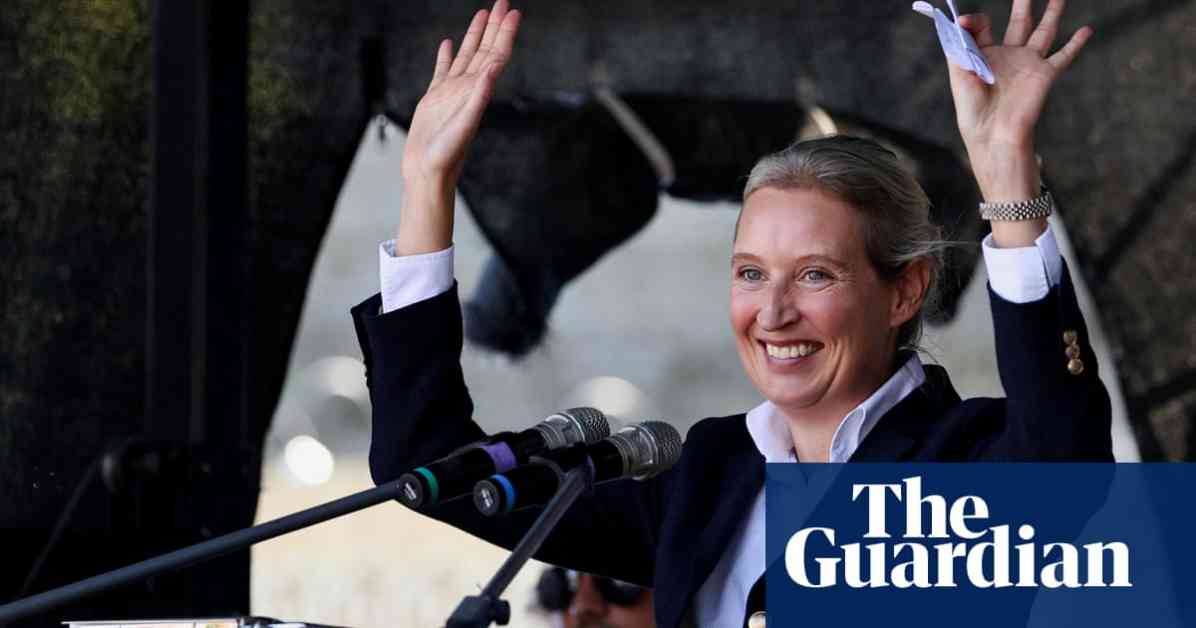Historic Win for AfD in East Germany State Elections
In a historic turn of events, a far-right party has emerged as the biggest force in a German state parliament for the first time since the second world war. Exit polls from two closely watched elections in the former communist east revealed that the Alternative für Deutschland (AfD) party secured the top spot in Thuringia and the second spot in Saxony. The dissatisfaction with Germany’s mainstream political parties was evident as voters expressed their support for the AfD, marking a significant shift in the country’s political landscape.
Alice Weidel, the co-leader of the AfD, described the party’s success as historic, emphasizing that it was the first time they had become the strongest force in a state election. This victory was seen as a rebuke to the current coalition in Berlin, signaling a shift in the political dynamics of the region. While the AfD has been making gains in recent years, this win solidified their position as a major player in German politics.
The rise of the AfD has raised concerns among other democratic parties, who have vowed to maintain a “firewall” of opposition to working with the far-right party. Despite its electoral success, the AfD has faced resistance in forming coalitions at the state level, as mainstream parties are wary of aligning with an extremist group. The results in Saxony and Thuringia were a blow to the ruling parties in Chancellor Olaf Scholz’s federal government, highlighting the shifting political landscape in Germany.
Populist Forces on the Left Gain Traction
Alongside the AfD’s victory, a new populist force on the left made significant gains in the state elections. The Sahra Wagenknecht Alliance (BSW), led by firebrand politician Sahra Wagenknecht, garnered substantial support with its platform of higher taxes on the rich, a tougher stance on immigration, and an end to military involvement in Ukraine. The BSW’s strong showing in both Saxony and Thuringia positioned it as a key player in potential government formations in the states.
Wagenknecht hailed the BSW’s performance as a historic achievement, noting that it was the first time a party had fared so well in state elections on its first attempt. The BSW’s success underscored the growing disillusionment with mainstream politics in the east, as voters sought alternative voices to address their concerns. With the potential to shape coalition talks in both states, the BSW emerged as a significant force challenging the traditional political establishment.
While the conservative Christian Democratic Union (CDU) maintained its stronghold in Saxony, the rise of the BSW posed a new challenge to the political landscape. The CDU’s leadership in Saxony and Thuringia reflected the party’s resilience in the face of shifting voter preferences. However, the emergence of populist forces on the left and right signaled a broader shift in the electorate’s mindset, with traditional parties facing increasing competition from fringe groups.
Challenges in Coalition-Building and Policy Implementation
The fractured results of the state elections presented challenges in coalition-building and policy implementation for the ruling parties. With no party securing an absolute majority, negotiations to form stable governments in Saxony and Thuringia were expected to be complex. The AfD’s strong showing, coupled with the rise of the BSW, added layers of complexity to the political landscape, requiring parties to navigate ideological differences and rivalries to reach consensus.
The coalition in Berlin, led by Chancellor Olaf Scholz, faced mounting pressure following the state election results. The coalition’s struggles to advance key policy initiatives, such as economic recovery and environmental reforms, raised questions about its effectiveness in governing the country. The Green Party’s characterization of the government as a “transitional administration” highlighted the challenges of maintaining unity and coherence in a diverse political landscape.
The AfD’s anti-migration and anti-Islam stance resonated with voters in the east, reflecting broader concerns about identity, security, and national sovereignty. The party’s emphasis on challenging the status quo and addressing citizens’ grievances struck a chord with disaffected voters, leading to its electoral success. However, the AfD’s controversial positions on historical remembrance and cultural identity have sparked debates about the party’s place in mainstream politics.
In contrast, the BSW’s emphasis on social conservatism and economic justice appealed to voters seeking an alternative to the mainstream parties. Wagenknecht’s calls for a more equitable society and a reevaluation of Germany’s foreign policy resonated with a segment of the electorate disillusioned with the status quo. The BSW’s rise as a significant political force underscored the diversity of opinions and perspectives in the east, challenging traditional party lines.
As Germany prepares for the next general election, the outcomes of the state elections in Saxony and Thuringia serve as a barometer of shifting political dynamics. The rise of populist forces on both the left and right reflects a broader trend of discontent with mainstream politics and a desire for change. The challenges of coalition-building and governance in the wake of the election results highlight the need for political parties to adapt to evolving voter preferences and address the underlying issues driving voter dissatisfaction.












